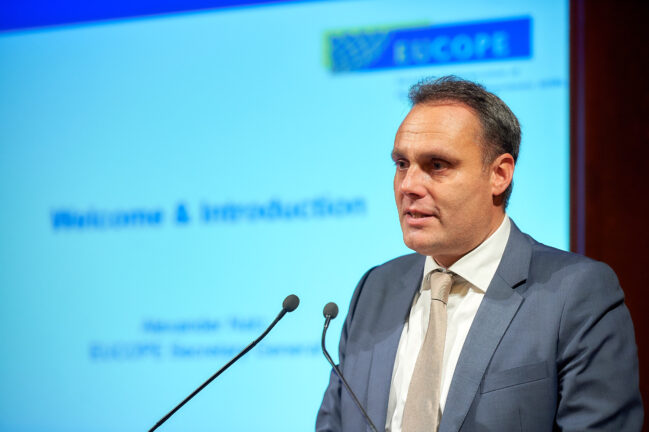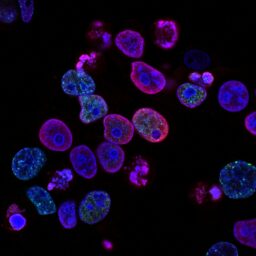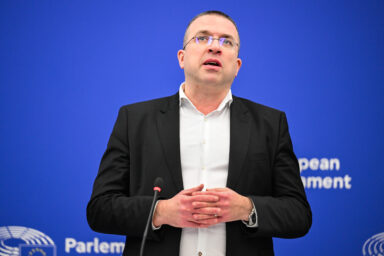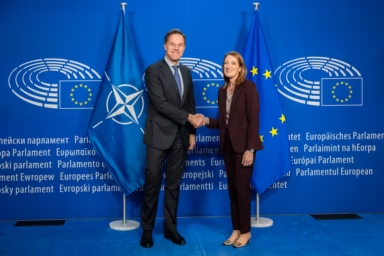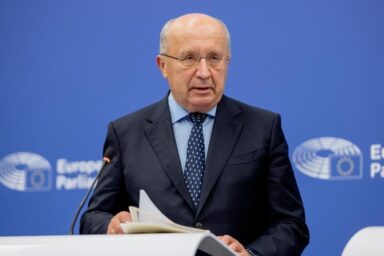Europe’s small and mid-sized pharma and biotech companies warn that trade politics risk distracting from the real priority: competitiveness and innovation. In spite of the largely unfavourable trade deal with the United States, the pharma sector should keep building a competitive, innovation-friendly environment.
In this interview, Alexander Natz and Matthias Heck of the European Confederation of Pharmaceutical Entrepreneurs (EUCOPE) argue the trade deal with the United States disadvantages EU-based manufacturing. Just as Europe is trying to anchor more production and research at home. They call for urgent action to accelerate the Biotech Act, fix barriers in clinical trials, and ensure coherence across legislative files such as the Critical Medicines Act and the pharma review. While acknowledging the Commission avoided harsher reciprocal tariffs, they stress Europe must deliver predictable reimbursement and enforce existing rules if it wants to keep research and development in the region.
Do you see any positives for the pharmaceutical sector in this agreement, or is it entirely negative?
Alexander Natz: This is overall a negative development. Tariffs on pharmaceuticals are not the right political decision. For decades, under WTO rules carved out pharmaceuticals, and rightly so.
You might be interested
It feels unjust to have tariffs on one side of the Atlantic but not the other. In the trade negotiations, pharmaceuticals were included while other industries were protected at 15 percent. That was the wrong choice.
Without innovation, there are no generics. — Alexander Natz, Secretary General, EUCOPE
The only positive is some predictability about the framework for the coming years. Though we still hope to return to zero tariffs, especially for innovative medicines. There is no point in treating them differently from generics. Without innovation, there are no generics.
Our members are also concerned about the “most favoured nation” risk, that a US administration could reference European prices in US price-setting.
Matthias Heck: One positive is that the EU refrained from reciprocal tariffs, which would have created risks for patient supply.
How do you think this deal will affect Europe’s global competitiveness in pharmaceuticals compared to the US and Asia?
Alexander Natz: A 15 percent tariff makes US production more attractive and disadvantages Europe. The EU has been trying to bring production back to Europe, not just for generics but also innovative medicines. That’s the idea of the Biotech Act. We need to accelerate it and make Europe attractive not only transatlantically, but also compared to Asia and other regions.
Matthias Heck: Efforts to make the EU attractive are partly undercut. But this is also an opportunity as key legislation moves forward. In the Biotech Act, we want to see better interaction between new and existing frameworks. For example, clinical trial rules with IVD or GMO legislation. And this ties into the Critical Medicines Act and the pharma review: one law should not undermine another.
So, you think the work on the Biotech Act needs to be accelerated?
Alexander Natz: It needs to be accelerated, for sure. We made this clear in meetings with the Commissioner at the BIO International Convention in Boston in June. The Biotech Act is a critical cornerstone. It will test how far the Commission is willing to do real industrial policy.
The Biotech Act needs to be accelerated, for sure. — Alexander Natz, Secretary General, EUCOPE
We need to make sure that production, especially in complex areas like CAR T-cells and ex vivo gene therapies, can be scaled up in Europe. And that we have the people to conduct research and manufacturing.
Do you have specific suggestions for what needs to be in this Act?
Alexander Natz: First, we need to fix issues with the Clinical Trials Regulation. It took a decade to set up but has not made Europe more competitive. We need to make it easier for physicians to participate in clinical trials and more attractive for multi-centric innovative trials to come to Europe.
Second, we need to work on clusters of innovation, centres of excellence like those developing in the Netherlands. All Europeans benefit from strong centres. We need to help small biotechs establish themselves, conduct research and start manufacturing.
The Biotech Act must align with the Critical Medicines Act and the pharma package. Otherwise, incentives in one law risk being undermined by restrictions in another. — Matthias Heck, EUCOPE
Matthias Heck: We also need legislative coherence. The Biotech Act must align with the Critical Medicines Act and the pharma package. Otherwise, incentives in one law risk being undermined by restrictions in another.
Do you expect reduced R&D investments in Europe?
Alexander Natz: It’s too early to say, but there is a real risk if healthcare systems are not attractive enough to reimburse highly innovative medicines. Europe has an excellent research infrastructure. For example, in rare diseases, but if there is no reimbursement framework to bring products to patients, research will leave. Just this week, a company announced it would not submit its breast cancer drug for NICE evaluation in the UK, citing the financial environment. This is exactly the type of scenario we want to prevent in the EU.
Matthias Heck: This is why signals matter. In the trilogues until the end of the year, we need to send the right message. Do we have an incentive framework that welcomes innovation, or not?
Does this deal make it harder to strike a compromise on the pharma package in trilogues?
Matthias Heck: The realisation that there is geopolitical pressure and a need for competitiveness has put more focus on the external dimension. In that sense, it might even be easier to find a compromise. Because there is now a stronger recognition of what is at stake and the role incentives play.
The Danish have also shown with their Life Sciences Strategy how national experiences can support the EU-level effort.
The EU just unveiled its Life Sciences Strategy with big ambitions to anchor innovation in Europe. Doesn’t this tariff deal undercut that?
Alexander Natz: Competitiveness is not only about new laws. It also means enforcing existing ones, like the Transparency Directive, which can speed up patient access. Predictability in reimbursement is just as important.
Matthias Heck: Yes, it undercuts the effort. But it also highlights the need for coherence across EU legislation. The Life Sciences Strategy, the Biotech Act, the Critical Medicines Act, and the pharma review must work together.
Are you going to react to the Commission based on this deal? Can the situation still be reversed?
Alexander Natz: We haven’t made a final decision yet. But we would join any effort to secure that innovative medicines are treated like generics in trade deals. Innovative medicines should not pay 15 percent.
Matthias Heck: We are in touch with the Commission. But it’s a trade deal close to finalisation, so it’s not easy to reverse. The key message to policymakers is: don’t let this distract from building a competitive, innovation-friendly EU. If we don’t have innovation here, patients in Europe will ultimately suffer.
Alexander Natz: We appreciate that the Commission avoided the worst-case scenario of 200 percent tariffs. But we must continue fine-tuning. “Most favoured nation” is what our members talk about even more than tariffs. We will keep raising it with decision-makers.
